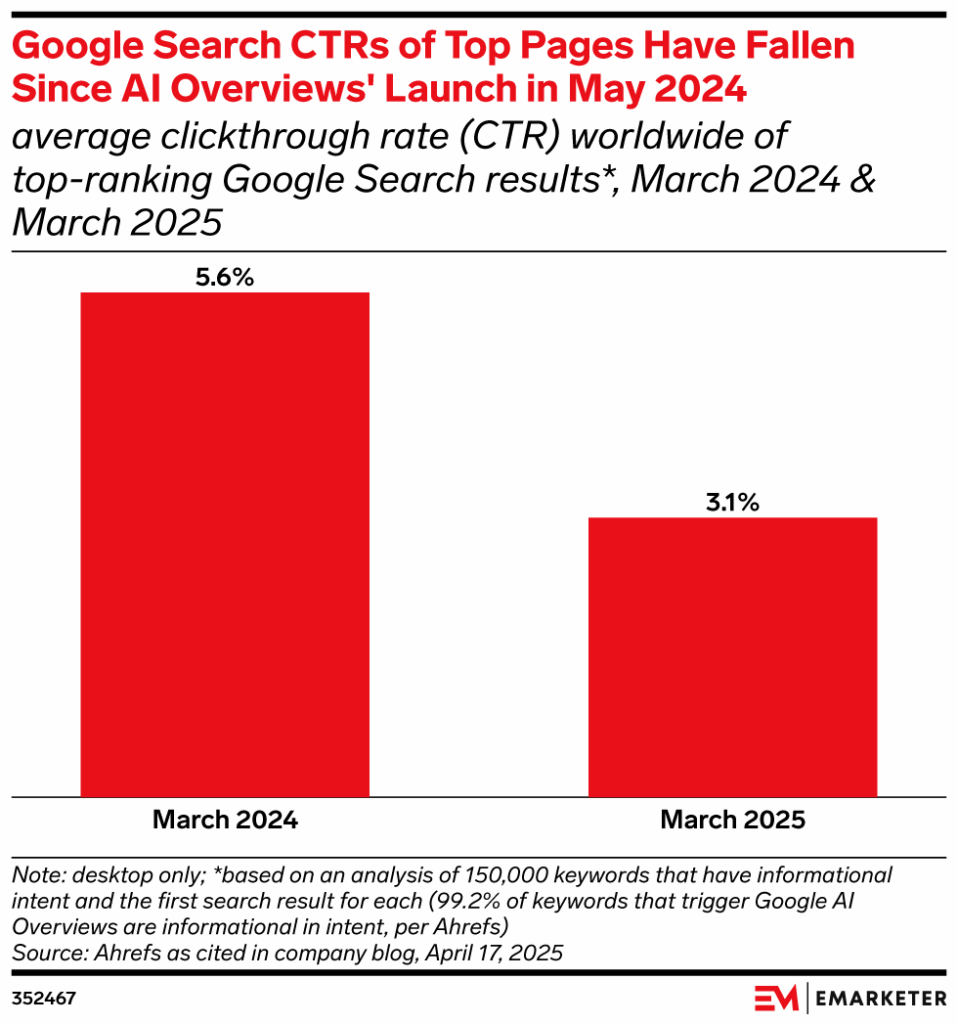AI’s sprawling influence on advertising can be seen just about anywhere you look, ranging from creative to how advertising is bought and seemingly everything in between.
But one area that is fundamentally impacted by AI’s pervasive presence is search.
Search engines like Google and Bing now display answers from their AI models above traditional website results. While AI chatbots have been used overall as a solution to provide answers users are looking for, they present a problem for publishers, advertisers, and content creators.
If people aren’t clicking through to web pages, the ad revenue subsidizing content vanishes, inventory shrinks, prices soar, and the web’s ecosystem unravels.
Here, we take a look at the scope of how search has changed, how AI summaries are impacting brands, publishers, and advertisers, and how your strategy should adapt.
AI’s mark on traffic and revenue
On one hand, AI-generated summaries are proving useful for users searching for an immediate answer. Perhaps, too useful. For publishers, AI’s stronghold on web content is producing a worst-case scenario for web traffic and, subsequently, revenue.
AI summaries aim to answer user queries directly on the search results page, reducing the need for users to click through to external websites. Studies show that the presence of AI summaries can significantly decrease click-through rates for top-ranking organic results.

Publishers depend on steady streams of website traffic to fuel their advertising revenue. When clicks dry up, ad impressions shrink, and so does income. The rise of AI-generated summaries is making this challenge even steeper, cutting into site visits and threatening subscription models that many publishers count on to stay afloat.
Content quality is already taking a hit
Concerns about content quality have already materialized and are widespread in search results. According to Ahrefs, 86.5% of top-ranking pages contain some AI-generated content.
While not all AI-generated content is harmful, publishers are increasingly concerned about how their work is being summarized. They have little control over what’s highlighted or distorted by AI models, which can misrepresent facts, overlook nuance, or even fabricate details. This becomes especially problematic when context matters.
Adding to the problem is a flood of low-quality AI content cluttering the internet, making it harder for audiences to find reliable information and further undermining the value of human-created work.
How are AI summaries impacting paid search?
So far, paid search has been insulated because AI summaries primarily surface on early-funnel, informational queries, where brands don’t usually bid. Paid search focuses on mid- to lower-funnel, purchase-driven keywords.
Some brands have seen traffic declines, but not sizable sales conversions.
Agencies are proactively adjusting by increasing investment in brand keywords to defend visibility when competitors or marketplaces appear in AI summaries. Some are reducing spend where organic links are already well-represented in summaries to avoid cannibalization, and increasing spend on broader, upper-funnel keywords to maintain presence in a changing SERP.
Lawsuits highlight tensions over data scraping
As AI models grow more sophisticated, access to high-quality training data has become a competitive battleground. Major brands are split between paying for licensed data and scraping it without permission, leading to legal and ethical disputes.
The most recent example is Reddit’s lawsuit against Anthropic. Reddit alleges that Anthropic (an AI company) scraped more than 100,000 user posts and comments from Reddit’s site without permission to train AI models.
Reddit claims Anthropic bypassed technical protections (robots.txt), collected deleted content, and refused to license data, violating its terms of service and gaining an unfair competitive advantage. This suit follows similar legal challenges Anthropic faces over unauthorized use of copyrighted books and song lyrics.
While some major brands, like Disney, are embracing emerging technologies, they’re also grappling with the risks. Disney has launched the Office of Technology Enablement to bring together its AI, AR, VR, and mixed reality efforts across the company. At the same time, it’s facing its own AI-related challenges, recently filing a lawsuit against Midjourney (an AI image generation company) over alleged copyright infringement involving AI-generated images.
This space is going to be messy for the foreseeable future, with lawsuits and new legislation as AI becomes more deeply integrated across technological touchpoints.
How publishers can respond and adapt to AI summaries
This erosion of ad revenue on the open web prompts a crucial question: where do we go from here?
Some speculate that content creators will increasingly move behind paywalls or focus on platforms where direct subscriptions and alternative monetization models are viable. This could lead to a more fragmented internet, where high-quality content is locked away from general search and only accessible to those willing to pay.
If the open web becomes less viable for ad placement, where do those dollars go? There are avenues brands can take and ways to protect their content.
The obvious answer, and arguably the most effective, is to diversify traffic resources. Publishers should prioritize social media, email newsletters, podcasts, and mobile apps to reduce their reliance on Google search traffic.
Moving to alternative channels shouldn’t be the only form of adaptation in your playbook. Adjust your SEO strategies to be more “AI-friendly” by creating content that is comprehensive, structured, and includes rich data like images and videos.
Embrace new measurement paradigms by moving past last-click attribution methods to more sophisticated models that capture the full customer journey, including AI-driven touchpoints. Combine media mix modeling with incrementality testing to understand true ROI.
What could publishers do as a result of the loss of inventory and reach? Produce unique, in-depth, and authentic content, such as proprietary research and expert interviews, that is difficult for AI to replicate.
You should explore revenue streams such as paywalls, subscriptions, and future licensing agreements with AI companies. There are even companies experimenting with charging AI crawlers for access. These methods ultimately weaken the effectiveness or relevancy of AI results.
The impact of AI on the open web is profound, multifaceted, and will continue to evolve. While the challenges for publishers are significant, success will belong to those who can strategically navigate these shifts, leveraging AI’s power while safeguarding the value of human-created content.
